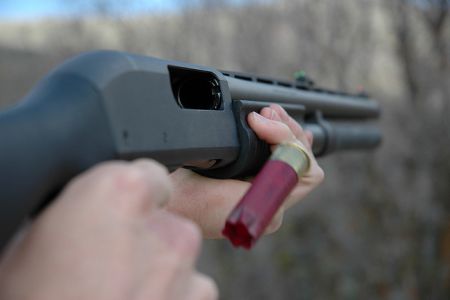For more on the politics on the registry, check out my blog post; The Long-Gun Registry; On the Firing Line.
---
Peter Stoffer doesn’t mince words.
“I decided back in 1995,” He said. “I’ve always been opposed. It’s a bureaucratic mess.”
That “mess” is the section of the Canadian Firearms Act mandating that owners of non-restricted firearms, such as rifles and shotguns, register their weapons with the federal government.
Stoffer, MP for Sackville-Eastern Shore, and eleven of his colleagues in the New Democratic Party voted to scrap the long-gun registry in November of 2009. Despite considerable pressure by labour unions, women’s groups and the association that represents all of Canada’s police chiefs, they don’t seem to be backing down.
Away from parliament hill, activists are putting pressure on those New Democrat MPs who supported the bill to kill the registry. Letter writing campaigns and demonstrations have been organized to encourage Peter Stoffer to change his mind. They have other protests, both in Ottawa and Halifax, in the works for before the bill comes to a vote in the house on September 22nd. Two MPs have already decided to change their vote to support the registry, but unless more of the rogue New Democrats join them, the registry faces an almost certain defeat.
Stoffer, however, doesn’t seem to be feeling the heat.
“It’s hard for me to say what the strategy to move them is; but they need to be moved.” Said Tony Tracy, representative for the Canadian Labour Congress. “Jack [Layton] and the NDP need to do what the Liberals are doing; they need to whip their caucus.”
The Canadian Labour Congress, along with several other labour organizations, has prepared a substantial opposition to the bill, rivaling that of the government’s public campaign to scrap the registry. A website was started that is aimed at pressuring the NDP and Liberal critics of the registry to hold their ground.
The labour movement is doing the exact opposite. The groups have been hammering MPs on the issue, especially those Nova Scotia MPs who supported the bill. Peter Stoffer has been the focus of much of their attention to date. The group has also been reaching out to the public to dispel what they say are myths being propagated by the government.
Tracey says that it doesn’t make sense to exempt long-guns from being catalogued,
“We register cats and dogs. We register cars. There’s very little in our lives that isn’t registered.” He said.
“I don’t see a compelling argument to get rid of it,” Tracey said. “It’s a matter of eradicating violence. It’s a public safety issue.”
According to Statistics Canada, rates of homicide by rifle and shotgun have indeed dropped by about half since the mid-90s, when the registry was introduced, far outpacing the fall in murders using handguns. Since the registry was introduced, robberies with a weapon have fallen by 50%. The Canadian Association of Emergency Physicians has also pointed to a sharp decline in the rate of suicides and spousal homicides involving firearms since the implementation of the firearms act. In 1996, 20 cases of spousal homicide involving a rifle or shotgun were recorded. That number went into a steady decline and reached its lowest point in 2007, when there were only six such cases.
It also protects police officers, says the Canadian Association of Chiefs of Police, who recently passed a unanimous resolution to support the registry. They have also begun a public relations campaign intent on salvaging the program.
“I have been a long-time supporter” Said Frank Beazley, Halifax chief of police. “I believe it’s working well. It’s very efficient and very economical.”
Part of Candice the campaign to scrap the registry asserted that while police officers across Canada check the registry about 11,000 times a day, the vast majority of those lookups were for names or addresses.
Beazley explains that the registry is used for more than just checking certification and registration on guns.
“If officers are going on call or to a dangerous area, we check to see if there are weapons in the home,” He said. “There’s a whole lot of difference between knowing there’s a gun in the house and guessing.”
Beazley himself owns several long-guns and said that registering them was a very easy process. It was done online and for free.
“I don’t know what the issue is.” He said.
In a move to stem the loss of jobs that could be caused if the registry is scrapped, Harper announced the consolidation of a pay center for the public service in Miramichi, New Brunswick, where the headquarters for the firearms registry is currently stationed. If the long-gun registry is scrapped, some of the jobs there could be lost.
According to Debby Kelly, the two are apples and oranges.
Kelly, regional vice-president for the Union of Solicitor General Employees, has been active in a campaign by the Public Service Alliance of Canada to save the registry. The PSAC has been active in not only saving the jobs associated with the registry, but saving the registry itself. The union will soon add a feature to its website allowing users to directly email Jack Layton to pressure him to influence his MPs.
“I don’t think it’s going to help the 240 workers at the [firearm] registry office.” She said.
Kelly said that those workers at the registry office do not have transferable skills to the pay center. More likely, those who are already in those positions across the country will either be forced to move to Miramichi or they will lose their jobs. While a few of those who may lose their jobs at the RCMP firearms center may be able to transfer, the rest will likely be cleaning out their desks for good.
The other catch is that while the pay center will create 550 new jobs, it won’t be for another six years. What’s more, Kelly says, is that it could take over a year to train new staff at the center.
“Up until to the point that Prime Minister Harper announced that there were going to be jobs coming here, he said there would be no job loss...We can estimate that there will be from 20 to 40 jobs [lost].” Said Kellie McKay, president of local 60001 of the Union of Solicitor General Employees; the union that represents the firearms registry workers.
McKay, who works in the registry’s call center, doesn’t put much stock in the anti-registry fervor that Stephen Harper is touting as a reason to axe the program.
“On a daily basis I may deal with anywhere from 75 to 100 calls a day...It’s not every day we may deal with someone who may be upset. It’s personally been awhile since I’ve had anyone that’s called who’s been upset.”
McKay certainly doesn’t agree with Stoffer’s evaluation of the program as a “mess.”
“The fees have been waved...The program has been streamlined,” She said. “I think the program is very effective.”




